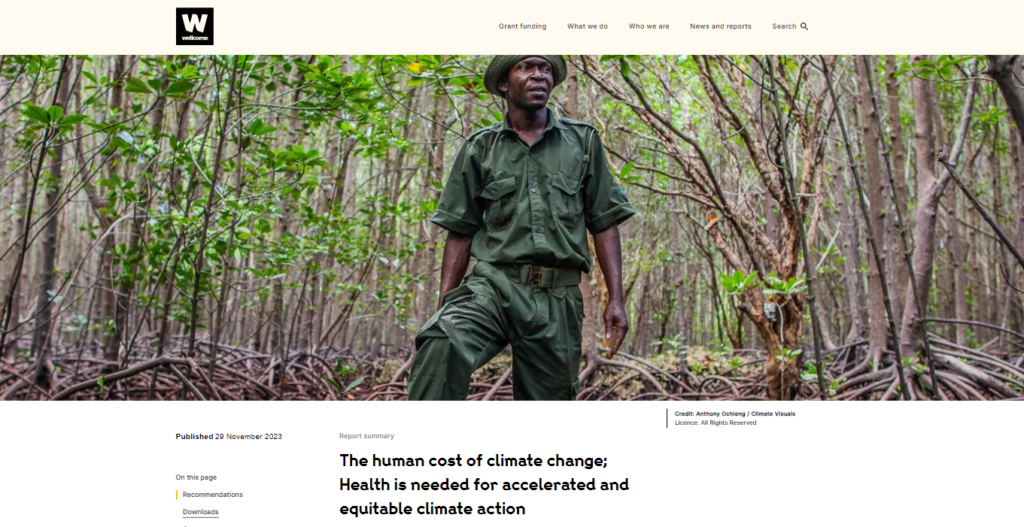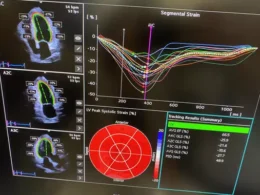the health strategist
platform
the most compreehensive knowledge portal
for continuous health transformation
and digital health- for all
Joaquim Cardoso MSc.
Chief Research and Strategy Officer (CRSO),
Chief Editor and Senior Advisor
December 6, 2023
What is the message?
This report underscores the critical link between climate change and human health, emphasizing the urgent need for accelerated and equitable climate action.
It provides evidence of the profound impacts of climate change on health and issues recommendations for policymakers, health professionals, civil society, and institutions to prioritize health in climate policies.

What are the key points?
Climate Change’s Impact on Human Health:
The report presents compelling evidence of how climate change directly affects human health, highlighting the urgency of addressing this intersection to mitigate the health crisis.
Urgent Health Crisis:
Climate change is framed as an urgent health crisis that demands immediate and comprehensive action. The report stresses the importance of aligning climate policies with health considerations to enhance global public health.
Role of Stakeholders:
Policymakers, health professionals, civil society, and both private and public institutions are identified as crucial stakeholders in addressing the health impacts of climate change. Collaboration among these entities is essential for effective climate action.
Recommendations for Action:
The report issues specific recommendations for stakeholders, urging them to integrate health assessments into all decision-making processes related to climate change. It calls for a commitment to an equitable transition to renewable energy, funding targeted research on climate and health, and advocating for health targets within international climate processes.
Equitable Transition to Renewable Energy:
A key recommendation is the commitment to an equitable shift from fossil fuels to renewable energy sources. This involves actively reducing carbon emissions and addressing short-lived climate pollutants.
Research and Finance:
The report emphasizes the importance of prioritizing and funding transdisciplinary research on climate and health to secure the necessary finance for effective solutions in climate action, public health, and sustainable development.
Inclusion in International Processes:
Advocacy for the inclusion of health targets and metrics within formal United Nations Framework Convention on Climate Change (UNFCCC) processes, including the Global Goal on Adaptation and Global Stocktake, is highlighted as a strategic approach.
Commitment and Agenda Forward:
Building on commitments made at COP28, the report calls for a sustained commitment to the climate and health agenda at the 77th World Health Assembly. It aims to capitalize on opportunities at COP16, COP29, and throughout the 2020s for further advancement.
DEEP DIVE

The human cost of climate change; Health is needed for accelerated and equitable climate action
Wellcome.org
November 29, 2023
This short report focuses on the intersection between climate change and health, outlines the evidence of the impacts of climate change on human health to inform policy and practice, and identifies opportunities to deliver health centred climate action.
What’s inside:
- Evidence of how climate change is impacting human health.
- Recommendations for ambitious and decisive action.
Who this is for:
- Policymakers
- Health professionals
- Civil society
- Private and public institutions
Recommendations
The climate crisis is an urgent health crisis that must be acted upon. Realising the ambition of the Paris Agreement and safeguarding human health in climate policies will drive healthy climate action and improve global public health. This requires policymakers, health professionals, civil society, and private and financial institutions to work together to ensure health is at the heart of climate action.
To deliver ambitious and decisive action, we call on relevant stakeholders to:
1. Mainstream health assessments in all decision making on climate change, to ensure all climate policies across mitigation and adaptation are evaluated in terms of risks and benefits to human health.
2. Commit to an equitable transition from fossil fuels to renewable energy sources, and promote action to reduce carbon emissions, and that of short-lived climate pollutants.
3. Prioritise, fund and support targeted transdisciplinary research on climate and health to unlock adequate finance for solutions in climate action, public health and sustainable development.
4. Advocate for the inclusion of health targets and metrics within UNFCCC formal processes, including in the Global Goal on Adaptation (GAA) and Global Stocktake (GST).
Building on the commitments made at COP28, commit to taking this agenda forward at the 77th World Health Assembly, and harness opportunities at COP16, COP29 and throughout the rest of 2020s.
To read the full report, click here.
Originally published at https://wellcome.org/reports












